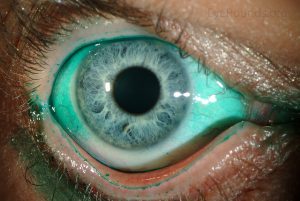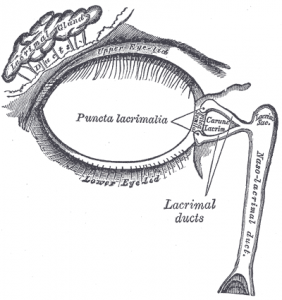Dry Eye
- Home
- Eye Care Services
- Dry Eye
What is Dry Eye?
 If you have gritty, sore eyes, you may be one of the millions of people suffering from dry eye. Diagnosing dry eye involves asking a number of questions, as well as performing a series of tests to determine the cause. The results of these will help your practitioner design the best treatment plan.
If you have gritty, sore eyes, you may be one of the millions of people suffering from dry eye. Diagnosing dry eye involves asking a number of questions, as well as performing a series of tests to determine the cause. The results of these will help your practitioner design the best treatment plan.
Tears help to lubricate and protect the eye.
There are a number of reasons why you may be experiencing dry eye. A common reason for dry eye is insufficient production of tears. However, quality of tears plays an important role in dry eye.
Your practitioner can measure the quantity of tears using a thread or paper test. The amount of drying may also be assessed using staining tests that identify areas on your eye that are drying out and damaging the surface of your eyes.
In order to assess the quality of tears, your practitioner will evaluate a thin layer of oil that reduces the evaporation of tears. The oil is produced by small glands in the eyelids. Careful examination of the lid margins to identify blockages and the amount of functioning glands will help to determine if you have Meibomian Gland Dysfunction (MG), which is the single biggest cause of dry eye.
Your practitioner may also take a tiny sample of tears to measure the salt concentration. This can help determine the severity of dry eye and help in measuring the effect of treatments.
Once the cause of dry eye has been established, there are a number of treatments that can keep the symptoms of dry eye to a minimum.
Ask about our dry eye plan.
What are the symptoms?
The tear film keeps the eye moist, lubricated, and nourished. Tears are made of three layers. Insufficient production of any of these components can result in dry eyes.
The outermost layer is called the lipid layer. A thin lipid layer causes the tear film to evaporate.
The middle watery layer of the tear film is produced by the lachrymal glands. Tears drain out through two small channels. Insufficient production results in dry eye.
The mucin layer keeps the tear film stable. A thin mucin layer can cause the tear film to destabilize and become dry.
There are many signs and symptoms associated with dry eye. These include soreness and grittiness, debris around the eyelids in the morning. Dry eye may also cause the eyes to water. You may even find that your vision blurs intermittently, requiring you to blink more frequently. Light sensitivity may also be associated with dry eyes.
Dry Eye Factors
Environmental factors such as dust, smoke, and wind can cause dry eyes. Air conditioning systems may lead to discomfort. Certain tasks, such as working on PCs, can significantly reduce blinking. Dry eye increases with age.
Consult with your eye care professional for simple treatments for eyelid-related conditions, like blepharitis.
Regular examinations are also important to detect any allergy. Although dry eye drops may alleviate allergy symptoms, you may need specific anti-allergy drops.
If your contact lenses feel increasingly uncomfortable through the course of the day, then you may benefit from upgrading to the latest generation of contact lens materials that retain the moisture in your eyes.
Finally, be sure to tell your practitioner if you have had laser treatment, such as LASIK, as this can also induce dry eye.
Punctal Plugs
 One method of treating dry eye is to prevent tears from draining out of the eye. Tears drain out of the eye through the tear ducts. In dry eyes, the amount of tears is reduced.
One method of treating dry eye is to prevent tears from draining out of the eye. Tears drain out of the eye through the tear ducts. In dry eyes, the amount of tears is reduced.
However, tears can be preserved using punctal plugs. These plugs are painlessly inserted into tear ducts.
Punctal plugs can be temporary or permanent. Once in place, they reduce the amount of tears draining out of the eye. The plugs are inserted in-office and most people cannot feel them. Over time, the eyes will feel more comfortable.
The good news is that dry eyes can be treated.
If you are experiencing problems,
we are only too happy to help so call us and make an appointment.